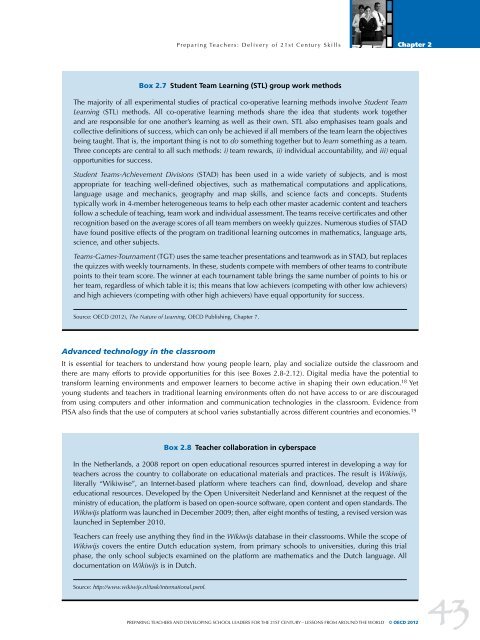Preparing Teachers and Developing School Leaders for the 21st Century
Preparing Teachers and Developing School Leaders for the 21st Century
Preparing Teachers and Developing School Leaders for the 21st Century
You also want an ePaper? Increase the reach of your titles
YUMPU automatically turns print PDFs into web optimized ePapers that Google loves.
Advanced technology in <strong>the</strong> classroom<br />
<strong>Preparing</strong> teachers: delivery of <strong>21st</strong> century skills<br />
Box 2.7 Student Team Learning (STL) group work methods<br />
<strong>the</strong> majority of all experimental studies of practical co-operative learning methods involve Student Team<br />
Learning (stl) methods. all co-operative learning methods share <strong>the</strong> idea that students work toge<strong>the</strong>r<br />
<strong>and</strong> are responsible <strong>for</strong> one ano<strong>the</strong>r’s learning as well as <strong>the</strong>ir own. STL also emphasises team goals <strong>and</strong><br />
collective definitions of success, which can only be achieved if all members of <strong>the</strong> team learn <strong>the</strong> objectives<br />
being taught. that is, <strong>the</strong> important thing is not to do something toge<strong>the</strong>r but to learn something as a team.<br />
three concepts are central to all such methods: i) team rewards, ii) individual accountability, <strong>and</strong> iii) equal<br />
opportunities <strong>for</strong> success.<br />
Student Teams-Achievement Divisions (stad) has been used in a wide variety of subjects, <strong>and</strong> is most<br />
appropriate <strong>for</strong> teaching well-defined objectives, such as ma<strong>the</strong>matical computations <strong>and</strong> applications,<br />
language usage <strong>and</strong> mechanics, geography <strong>and</strong> map skills, <strong>and</strong> science facts <strong>and</strong> concepts. students<br />
typically work in 4-member heterogeneous teams to help each o<strong>the</strong>r master academic content <strong>and</strong> teachers<br />
follow a schedule of teaching, team work <strong>and</strong> individual assessment. <strong>the</strong> teams receive certificates <strong>and</strong> o<strong>the</strong>r<br />
recognition based on <strong>the</strong> average scores of all team members on weekly quizzes. numerous studies of stad<br />
have found positive effects of <strong>the</strong> program on traditional learning outcomes in ma<strong>the</strong>matics, language arts,<br />
science, <strong>and</strong> o<strong>the</strong>r subjects.<br />
Teams-Games-Tournament (tgt) uses <strong>the</strong> same teacher presentations <strong>and</strong> teamwork as in stad, but replaces<br />
<strong>the</strong> quizzes with weekly tournaments. in <strong>the</strong>se, students compete with members of o<strong>the</strong>r teams to contribute<br />
points to <strong>the</strong>ir team score. <strong>the</strong> winner at each tournament table brings <strong>the</strong> same number of points to his or<br />
her team, regardless of which table it is; this means that low achievers (competing with o<strong>the</strong>r low achievers)<br />
<strong>and</strong> high achievers (competing with o<strong>the</strong>r high achievers) have equal opportunity <strong>for</strong> success.<br />
source: oecd (2012), The Nature of Learning, oecd Publishing, chapter 7.<br />
Chapter 2<br />
it is essential <strong>for</strong> teachers to underst<strong>and</strong> how young people learn, play <strong>and</strong> socialize outside <strong>the</strong> classroom <strong>and</strong><br />
<strong>the</strong>re are many ef<strong>for</strong>ts to provide opportunities <strong>for</strong> this (see Boxes 2.8-2.12). digital media have <strong>the</strong> potential to<br />
trans<strong>for</strong>m learning environments <strong>and</strong> empower learners to become active in shaping <strong>the</strong>ir own education. 18 yet<br />
young students <strong>and</strong> teachers in traditional learning environments often do not have access to or are discouraged<br />
from using computers <strong>and</strong> o<strong>the</strong>r in<strong>for</strong>mation <strong>and</strong> communication technologies in <strong>the</strong> classroom. evidence from<br />
Pisa also finds that <strong>the</strong> use of computers at school varies substantially across different countries <strong>and</strong> economies. 19<br />
Box 2.8 Teacher collaboration in cyberspace<br />
in <strong>the</strong> ne<strong>the</strong>rl<strong>and</strong>s, a 2008 report on open educational resources spurred interest in developing a way <strong>for</strong><br />
teachers across <strong>the</strong> country to collaborate on educational materials <strong>and</strong> practices. <strong>the</strong> result is Wikiwijs,<br />
literally “Wikiwise”, an internet-based plat<strong>for</strong>m where teachers can find, download, develop <strong>and</strong> share<br />
educational resources. developed by <strong>the</strong> open universiteit nederl<strong>and</strong> <strong>and</strong> Kennisnet at <strong>the</strong> request of <strong>the</strong><br />
ministry of education, <strong>the</strong> plat<strong>for</strong>m is based on open-source software, open content <strong>and</strong> open st<strong>and</strong>ards. <strong>the</strong><br />
Wikiwijs plat<strong>for</strong>m was launched in december 2009; <strong>the</strong>n, after eight months of testing, a revised version was<br />
launched in september 2010.<br />
teachers can freely use anything <strong>the</strong>y find in <strong>the</strong> Wikiwijs database in <strong>the</strong>ir classrooms. While <strong>the</strong> scope of<br />
Wikiwijs covers <strong>the</strong> entire dutch education system, from primary schools to universities, during this trial<br />
phase, <strong>the</strong> only school subjects examined on <strong>the</strong> plat<strong>for</strong>m are ma<strong>the</strong>matics <strong>and</strong> <strong>the</strong> dutch language. all<br />
documentation on Wikiwijs is in dutch.<br />
source: http://www.wikiwijs.nl/task/international.psml.<br />
PreParing teachers <strong>and</strong> develoPing school leaders <strong>for</strong> <strong>the</strong> <strong>21st</strong> century – lessons froM around <strong>the</strong> World © OECD 2012<br />
43


